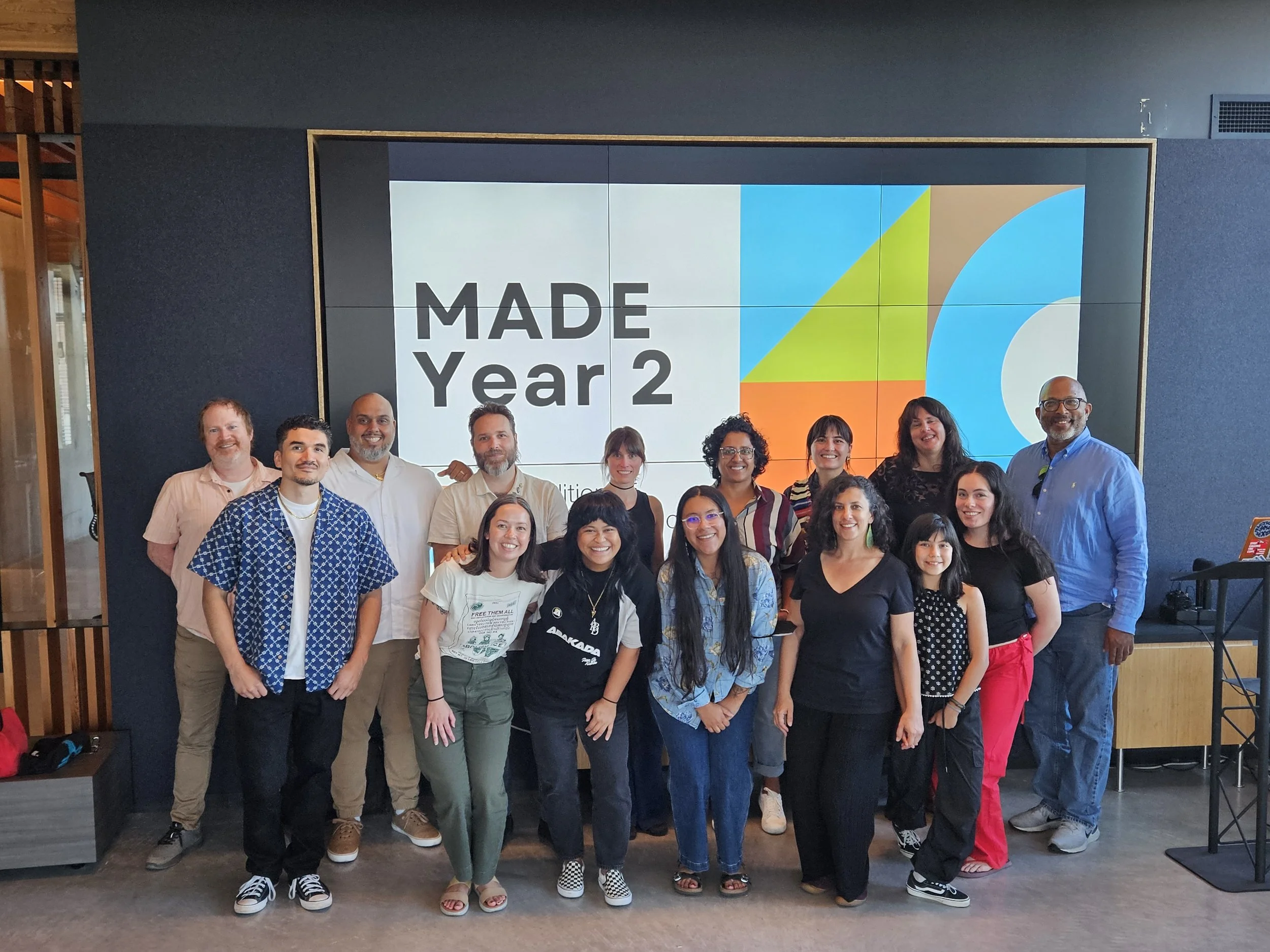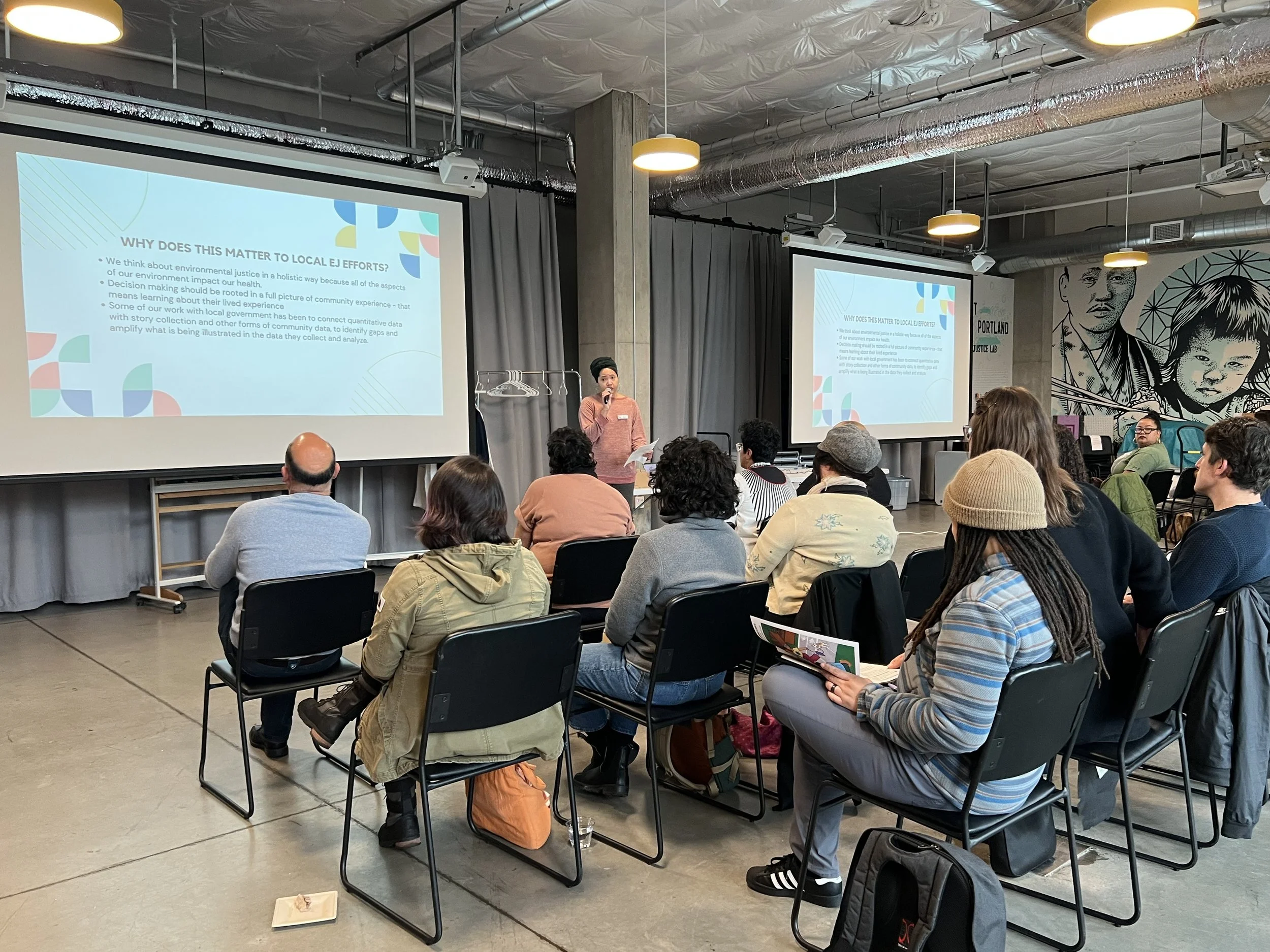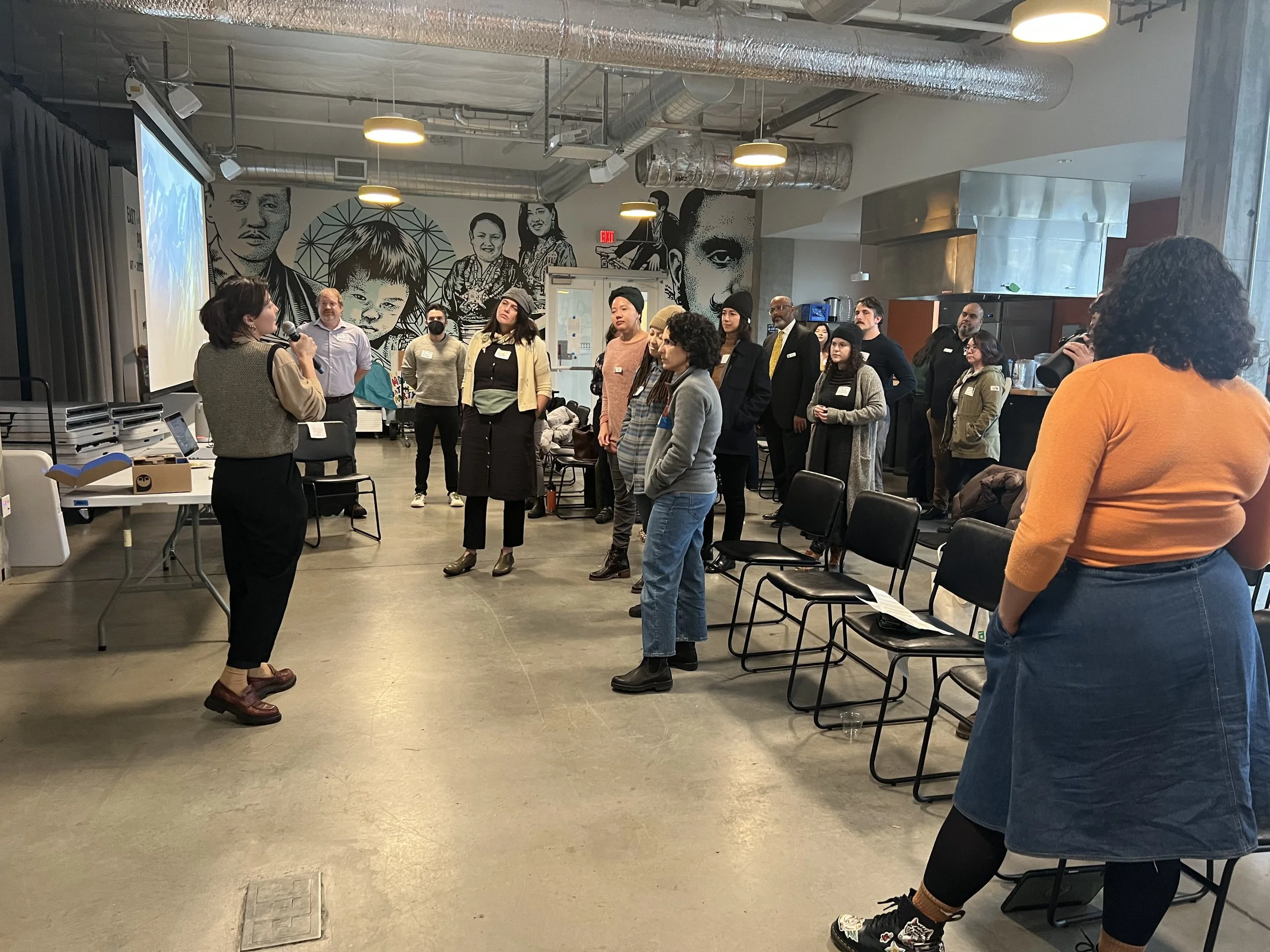A LOOK INTO OUR YEAR TWO CELEBRATION
Steering Committee Members Celebrating MADE Year 2
A room full of chatter, music, and food marked the closing of another year of planning, dreaming, and co-designing a local data system. After 12 months of steering committee and workgroup meetings, the group came together for an evening of community building and celebration. The evening included a farm-to-table dinner of vibrant seasonal produce grown and catered by Daytrip Farm Collective and embodied the vision that we are working towards – one in which all Portlanders can live in healthy, connected communities.
It’s a future that we believe the Portland MADE Data System can help make possible, bringing us closer to a city where everyone, especially those on the frontlines of climate change, have the ability to thrive.
WHAT IS MADE (Modernized Anti-Racist Data Ecosystem) FOR HEALTH JUSTICE?
Convened by the Coalition of Communities of Color, our goal with the Portland MADE Data System is to create a community-led data system – a digital garden designed to nurture our communities’ data, not extract from them. It will hold the experiences and knowledge of these communities so that their lived experiences can be used to advocate for their needs, desires, and shape policies. The Portland MADE Data System will also function to hold decision-makers accountable and build community power to improve livelihoods.
YEAR TWO KEY MILESTONES
Our second year was a time of significant technical foundation-building and deepening community engagement around this work. Our key milestones include:
Centering Community Data: We reminded steering committee members that our ecosystem is primarily designed to hold community data.
Community data is evidence about communities’ everyday lives, realities, and desires. This can include stories, maps, songs, and more.
Developing a Governance Foundation: We created a Data Charter – a set of values and guiding principles that govern our work together to ensure data is shared ethically, protected, and used for community benefit.
Designing the System Structure: We outlined who will manage the system, roles, and how community and environmental justice data will be organized.
Initiating the Build Phase: We drafted a Request for Proposals (RFP) to find a technical partner to build the online data platform.
Investing in Long-Term Management: We began the process to hire a Data Systems Administrator who will maintain and steward the system.
WHY THIS WORK MATTERS AND WHO BENEFITS FROM IT
In a rapidly changing climate, it’s essential that community-based organizations and local governments work together to advance environmental justice and health equity. The MADE Data System connects and aligns community data, ensuring that the needs of frontline communities are influencing decision-making, informing policies, and strengthening programs. The following Q&A interviews delve into how we are making our vision a reality by building our upcoming database where community-based organizations like Verde, the Urban League, etc. can pool their stories and data to cultivate community power.
Inside the Portland MADE Data System: Partners Perspective!
Q&A: MEET NOAH, TABITHA, AND BLYTHE
We are thrilled to introduce three of our steering committee members. We have Noah Truesdale (he/him), Data Analyst with the Urban League of Portland; Tabitha Joaquin (she/her), Climate Resilience and Environmental Justice Manager at Unite Oregon; and Blythe Garma (she/her), Deputy Director of Verde.
Can you tell us a bit about your organization’s mission or focus?
N: We focus mainly on building educational justice for Black Oregonians. Our mission is really about empowering marginalized communities across Oregon, building economic justice, building health out and equity justices, and countering the white supremist forces that have shaped Oregon and continue to shape our society in a lot of different facets.
T: We have decades of experience in organizing immigrants, refugees and people of color and low income Oregonians to address racial justice and human rights issues across Oregon. We operate across the state to connect and empower community members to find the solutions Our communities need in ways that disrupt patterns of extraction, exploitation and dependency. We define our priorities and issues through an in depth engagement process with members who represent a broad section of Oregon's culturally diverse communities.
B: Our mission focuses on building environmental wealth through programming. Our social enterprise installs ductless heat pumps or mini splits in homes of eligible recipients. Our first community solar project went online this week, aiming to replicate access to solar energy without homeownership. We have advocacy and a five-member team doing key legislative work, pushing community voices, and championing bills that shape community well-being.
How does your organization’s work intersect with climate and health justice?
MADE Year 1 Community Kickoff Party - Connecting with Local Environmental Efforts.
N: Environmental justice encompasses a lot of different kinds of work. Our work doesn't necessarily directly impact environmental fights in the way that you would think of it, but it affects the trickle downs. It affects the ability to pay your utilities and have access to electricity. It impacts your ability to have clean water. It impacts the impacts of when you're exposed to toxic chemicals and need medical support and don't have the resources to navigate that.
B: When we're talking about the cross between climate and health justice, I often think about our social enterprise – our ability to install ductless heat pumps in homes is not only offering them a bit of a cost saving benefit for their wallet, but we're also improving quality of life. We're improving air quality. We're allowing for homes to not be overly heated. Obviously, it's just one piece of a larger puzzle of making sure that their whole home can be safe and that they can thrive where they reside. But health justice is so, so vastly important and related to climate health.
What impact do you hope the Portland MADE Data System will have in advancing your community goals? Can you describe what that can look like?
MADE Year 1 Community Kickoff Party - Unifying Community Leaders and Movements.
N: I really look forward to seeing the system as a way to unify my organization's experience dealing with health and climate injustices, bringing other organization’s stories in to make a more powerful effort to advocate for the solutions that impact our communities. And I think the capacity and power of MADE allows each organization to kind of resonate with their own story and echo it and reverb it with a bunch of different other organizations together.
T: We hope that this initiative will move our community goals forward by helping us better understand what our people need and where our efforts should go next. By lifting up the work that's already been done, we can avoid starting from scratch and focus on filling gaps that require attention. Too often, community members are asked the same question again and again, and it leads to frustration, survey fatigue and feeling that their voices over time do not matter. We can re-traumatize individuals who have had negative experiences.
B: So I really see the community goals as creating less barriers to our existing work and how we're able to show up in the community. And really hear from ground level to say, “This is what we're hearing”, and then we're able to act, and put funds to the work that we're doing.
How can a CBO’s involvement in the Portland MADE Data System contribute to climate and health justice?
T: It enables CBOs to access and support their own organizing, advocacy and healing work by building on what works and not repeating what doesn't. So in short, CBO involvement makes the Portland MADE Data System a tool for equity, not just efficiency, and it helps shift power towards communities who are most impacted by climate and health injustices, and ensures the solutions we built are informed, accountable and just.
MADE Year 2 Wrapped Up
IMPORTANCE OF COMMUNITY IN THIS WORK AND COMMUNITY TRUST
The Portland MADE Data System will not only serve as a container for community gathered data but also a bridge for organizations who don’t typically work with each other. In our digital community garden, each organization that contributes brings their own level of expertise that will be honored and protected. Our interviewees all touched on the importance of relationships in this work and the accountability to the communities they serve. With the Portland MADE Data System we foresee a diverse digital community garden that is grounded in trust and accountability.





